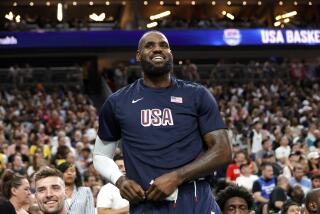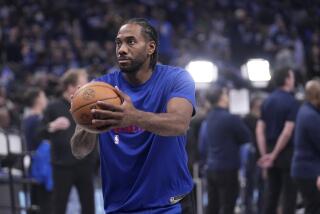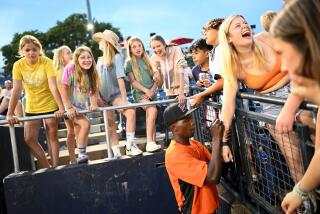Young Africans Score a Stint at Camp Hoops
- Share via
JOHANNESBURG, South Africa — Standing 7 feet and 1 inch tall, weighing 188 pounds and wearing a size 18 1/2 shoe, Cheikh Ahmadou Bamba Fall hopes that his physique and talent may one day land him a spot in America’s premier basketball league.
The prospect of playing in the National Basketball Assn. dominated his thoughts as he was growing up, scrimmaging barefoot with other lanky and athletically gifted teens, on dirt courts in the West African nation of Senegal. St.-Louis, his hometown perched on the shore of the Atlantic, has no gym.
“I want to play in the NBA,” says Fall, 17, who got his first real pair of basketball shoes in December. A shy smile crosses his face as he gleefully explains: “I just like blocking people.”
The gangly teenager may have leapt a little closer to realizing his dream this week. He is among about 100 junior African basketball players who were selected from across the continent to participate in “Africa 100 Camp,” where they are getting training from a group of NBA players, many of whom hail from Africa.
The camp, which wraps up Saturday, is taking place at the American International School of Johannesburg and is the first of its kind in Africa to combine basketball instruction with educational programs and community outreach, NBA and International Basketball Federation officials said. It provides an opportunity for African NBA stars to give something back to their homeland while promoting the sport and scouting for new talent, the representatives said.
“It’s about shining the light of the world on African basketball,” said Bob Lanier, an eight-time NBA All-Star and former player for the Detroit Pistons and Milwaukee Bucks.
“It’s important, because Africa is considered the last frontier,” added New Jersey Nets center Dikembe Mutombo, who was born in Zaire, now called Congo. “There is so much talent in Africa. What is missing are the opportunities and the contact with the outside world. We can give every young player the chance to dream that one day he could be the next Mutombo.”
The Nets center is joined at the camp by Cleveland Cavaliers center DeSagana Diop and Toronto Raptors center Mamadou N’diaye, both from Senegal; Ruben Boumtje-Boumtje of Cameroon, a center for the Portland Trail Blazers; and forward-guard Michael Curry, who plays for the Toronto Raptors.
Although second to soccer in terms of popularity in Africa, the game has surged in recent years as American basketball spreads its marketing tentacles across the globe. NBA games and related programming are broadcast to 212 countries and territories in 42 languages, officials said.
But in cash-strapped Africa, where basic infrastructure -- much less athletic facilities -- is sorely lacking, little emphasis is placed on developing sports such as basketball. Enthusiasts are often forced to play on dirt fields, using homemade rims and sharing substandard balls.
“Some courts are not good, but when you’re growing up [in Africa] sometimes you have no choice,” said Diop, 21, the Cleveland center. At nearly 7 feet tall, he was selected out of high school by the Cavaliers in the first round of the 2001 NBA draft.
That’s what Samba Gueye, 16, also from Senegal, hopes will happen to him. The 6-foot-10 teen practices twice a day, five days a week, at the one gym in the capital, Dakar.
“I play basketball, not just because I’m tall, but because I love the game,” he said, adding that he has already been approached by an assistant to USC coach Henry Bibby. “If I don’t get to play in the NBA, I will become an engineer.”
It is such confidence and ambition that those sponsoring the clinic say they want to instill in the attendees, whose ages range from 16 to 20.
Building a wholesome character and nurturing scholastic skills are as important as promoting the game, said Amadou Gallo Fall, director of scouting for the Dallas Mavericks.
As part of the program, the participants have to attend daily seminars focusing on teamwork and leadership as well as on topics such as fighting drug abuse and preventing HIV and AIDS.
The aim is for the young players to take home not just basketball skills but also life skills, said Anicet Lavodrama, international relations and development manager for the International Basketball Federation. “Basketball is significant,” he said, “because it teaches us things that we need in our regular lives: teamwork, leadership.”
More to Read
All things Lakers, all the time.
Get all the Lakers news you need in Dan Woike's weekly newsletter.
You may occasionally receive promotional content from the Los Angeles Times.








